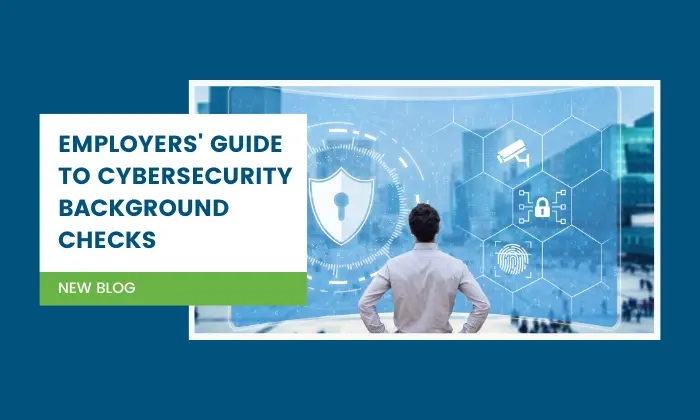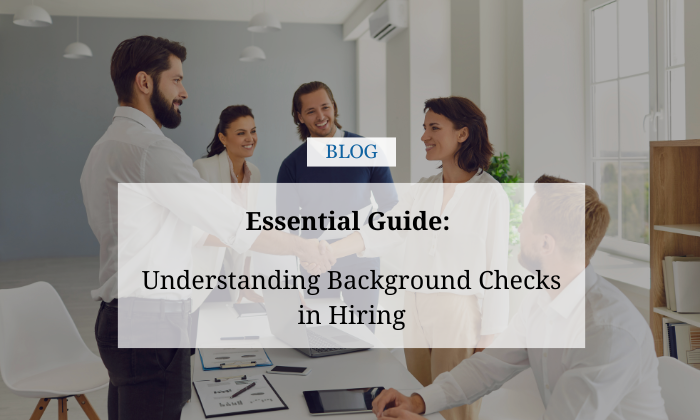Prior to bringing someone on board for a cybersecurity position within your organization, it’s crucial to ensure they possess the essential qualifications for the role and can be relied upon with your company’s sensitive data.
IBM’s report highlights that in 2022, data breaches incurred an average cost of $4.35 million, a figure projected to rise to $4.45 million in 2023.
Safeguarding against expensive data breaches and cyber threats is paramount for all employers, making the hiring of skilled cybersecurity experts imperative.
Securecheck360 is your trusted partner for conducting comprehensive background checks for employers across all states and U.S. territories.
Securecheck360
Here at Securecheck360, we’re experts in delivering top-notch Employment Background Screening Services, serving businesses of all sizes across the globe. Our customized solutions are finely tuned to meet the unique requirements of small, mid-sized, and large organizations. We’re dedicated to equipping companies with the vital tools and insights they need to make well-informed hiring choices. As one of the leading background verification companies, we’re committed to supporting even small businesses as trusted background check companies for small businesses to ensure they have the confidence to build the best teams for their success.
To know more about our services, book your free demo today!
What is a Cyber Security Background Check?
Cybersecurity experts often have access to a company’s intellectual assets and customer-sensitive data.
To guarantee the recruitment of capable and dependable candidates, it is imperative to carry out thorough background screenings on all potential hires.
Such cybersecurity background checks may delve into an applicant’s criminal record, qualifications, educational background, previous work experience, and other pertinent job-related details.
Why Should Cybersecurity Professionals Be Screened?
Cybersecurity experts bear the responsibility of safeguarding both corporate networks and proprietary data. Additionally, they are entrusted with the protection of sensitive customer information to adhere to data privacy regulations.
Given these crucial responsibilities, cybersecurity professionals are granted access to a wealth of confidential data. Consequently, it is paramount for organizations to verify that their new hires possess the necessary qualifications for their roles and can be relied upon to handle sensitive information with the utmost care and trustworthiness.
What Shows Up on a Cyber Security Background Check?
The information you’ll find in a cybersecurity background check can vary depending on the specific searches you request and your applicant’s background.
For positions requiring security clearances, more comprehensive searches and fingerprint-based inquiries might be necessary. Typically, employers request the following searches for cybersecurity roles:
- Criminal History: This check assesses an applicant’s criminal record to determine any potential risks associated with handling sensitive company and client information. Details may include:
- Criminal case number
- Offense/arrest date
- Name of offense
- Offense level (misdemeanor or felony)
- Case disposition
- Disposition date
- Sentence information (if available)
- Employment Verification: This process confirms the accuracy of an applicant’s work history as stated on their resume. It includes details such as past employers’ names and addresses, employment dates, and job positions held.
- Credentials Verification: Cybersecurity professionals often need specific technology certifications to demonstrate their qualifications. A credentials verification report provides information about claimed certifications, including:
- Certification validity
- Certificate number
- Type of certification
- Issuing organization
- Issuance date
- Expiration date
- Public discipline or sanctions (if any)
- Education Verification: Most employers require cybersecurity professionals to hold at least a Bachelor’s degree in a relevant field. An education verification confirms whether an applicant has the claimed degree and includes details about the educational institutions attended and attendance dates.
- Credit Check: Some cybersecurity positions may involve access to sensitive information, making credit checks important to assess an applicant’s financial stability. However, note that certain states have restrictions on employment credit checks. The information typically obtained in an employment credit check includes payment history, available credit, bankruptcy history, collection accounts, current and previous employers’ names and addresses, and indicators of financial distress.
- Sex Offender Registry Search: Given the access to customer information in cybersecurity roles, many companies request national sex offender registry searches to ensure applicant safety. This search examines registries across states to identify any registered sex offenders. If an applicant is found on the registry, the report may provide details such as registered address, marks, tattoos, photographs, the nature of the offense requiring registration, and conviction details (if available).
These comprehensive background checks help organizations make informed decisions when hiring cybersecurity professionals, ensuring that they are well-qualified and trustworthy for handling sensitive data and information security.
How to Conduct Background Checks for Cybersecurity Roles
1. Create a Comprehensive Policy: Establish a policy that aligns with laws, promotes uniformity in background checks, and includes steps for HR. Train staff to avoid bias and errors.
2. Notify and Get Consent: Before conducting a background check, inform the applicant and obtain written consent as per FCRA. Refusal allows you to deny employment.
3. Choose the Right Provider: Select a background check company that ensures accurate, legal, and prompt reports. Securecheck360 offers comprehensive, verified reports.
4. Customize Background Screens: Tailor background checks for cybersecurity roles with options from Securecheck360, accommodating various needs and budgets.
5. Transparent Communication: Maintain transparency throughout, explaining the purpose of background checks. Use SecureCheck360’s mobile app for easy access to information.
6. Assess Convictions Individually: Evaluate criminal convictions based on their relevance, age, and severity to the job, avoiding blanket rejections.
7. Follow Adverse Action Steps: Comply with FCRA by sending a pre-adverse action notice, providing time for corrections or evidence of rehabilitation before making a final decision.
What Disqualifies You on a Cyber Security Background Check?
Cybersecurity employers reject candidates during background checks for several common reasons:
- False Work Experience: Applicants who exaggerate their security expertise may be denied when employers verify their work history.
- Misrepresented Education and Certifications: Falsely claimed degrees or certifications often lead to job denials after verification.
- Disqualifying Convictions: Criminal records related to dishonesty, such as identity theft or hacking, can result in job rejections.
- Lack of Required Certifications: Candidates without necessary certifications may be passed over for those who meet the job’s certification criteria.
In essence, employers prioritize accuracy and integrity to protect sensitive information and systems in the cybersecurity field.
Conclusion
Conducting thorough and accurate background checks is an essential step in the hiring process for cybersecurity professionals. It helps organizations ensure they hire qualified and trustworthy individuals who can safeguard sensitive information and uphold the integrity of their cybersecurity systems.
By following best practices, adhering to legal regulations, and partnering with a reliable background check provider like Securecheck360, businesses can make well-informed hiring decisions that enhance their cybersecurity defenses and protect their valuable assets.
FAQ
How long does a cybersecurity background check take?
The duration of a cybersecurity background check varies based on factors like the method used and security clearance requirements. Positions needing security clearances typically involve more extensive checks and can take longer.
With Securecheck360, a trusted and compliant background check provider, you can often get thorough cybersecurity reports within hours to a few days. Choosing a less reliable company might mean waiting a week or more for incomplete or inaccurate results.
How far back does a cybersecurity background check go?
The FCRA and state laws determine the timeframe for a cybersecurity background check:
For positions paying less than $75,000 annually, the FCRA limits reporting on certain items (like arrests without convictions, Chapter 13 bankruptcies, collections, civil judgments, tax liens, and lawsuits) to seven years.
While the FCRA doesn’t restrict reporting of criminal convictions, some states impose time limits.
Past employment, education, and certifications can be reported without time restrictions.







